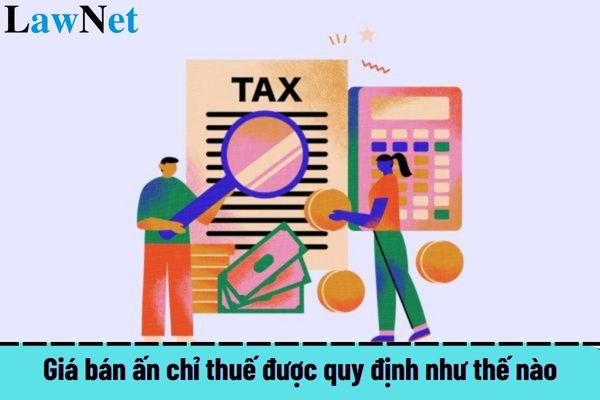What are regulations on selling prices of tax prints in Vietnam?
What are regulations on selling prices of tax prints in Vietnam?
Based on sub-section 9.2, Section 9, Part 2 of the tax print Management Procedure issued with Decision 2262/QD-TCT in 2020, the regulation of the selling prices of tax prints is as follows:
tax print Selling Prices
The TVQT Department at the General Department of Taxation, the TTHT Division at the Tax Department shall implement:
- The General Department of Taxation determines the selling prices of tax prints issued by the General Department to be uniformly applied at tax offices at all levels; The Tax Department determines the selling prices of forms issued by the Tax Department to be uniformly applied at the Tax Department Office and its affiliated tax branches.
- The selling prices of tax prints printed by the General Department of Taxation and the Tax Department are determined as follows:
+ Selling price of tax print = Printing cost + Issuance cost.
+ Issuance cost = Printing cost x 25%.
Note:
If during the year the printing price of a type of tax print changes, a new printing contract must establish a new form list and a new form symbol.
Example: In 2019, at the Binh Duong Tax Department:
First print: Printing price of 20,000 VND/book, starting from number 0000001 of symbol 37AA/19P.
Subsequent print in the same year: Printing price of 25,000 VND/book, starting from number 0000001 of symbol 37AB/19P.
The selling prices of tax prints printed by the General Department of Taxation and the Tax Department are determined as follows:
- Selling price of tax print = Printing cost + Issuance cost.
- Issuance cost = Printing cost x 25%.

What are regulations on selling prices of tax prints in Vietnam? (Image from the Internet)
What are regulations on management, monitoring, and use of tax print storage in Vietnam?
Based on sub-section 2.1, Section 1, Part 2 of the tax print Management Procedure issued with Decision 2262/QD-TCT in 2020, the tax print storage on the QLAC application includes the following types:
- Main Storage Type: Contains types of forms still in valid use.
- Pending Destruction Storage Type: Contains forms no longer in use, damaged forms, forms exposed to moisture, termite damage, mouse bites... awaiting destruction.
- Sample Storage Type: Contains forms used for sample provision (opened at the General Department of Taxation, Tax Departments).
- Copy Storage Type: Stores copies of tax receipts.
- Separate Monitoring Storage Type: Used for importing and exporting forms issued by the tax sector of organizations and individuals when changing tax management agencies within a locality or city under direct central government control.
Additionally, as stipulated in sub-section 2.2, Section 1, Part 2 of the tax print Management Procedure issued with Decision 2262/QD-TCT in 2020, the management, monitoring, and use of tax print storage is as follows:
[1] At the General Department of Taxation: The Finance Management Department manages various storages on the tax print management application created by the General Department of Taxation along with the physical storages to serve management and use needs.
[2] At Tax Departments, Tax Branches:
- The Propaganda and Support Division/Team: Manages various storages on the tax print management application created by Tax Departments, Tax Branches.
- Offices or Finance - Management - Forms Departments, Administration - Human Resources - Finance - Management - Forms Teams: Manage physical storages.
Based on the above storage types, tax authorities at various levels can create multiple Storage Codes and Storage Names corresponding to each Storage Type on the tax print management application to fulfill management and usage needs at tax authorities.
What do tax prints include?
According to the provisions in Section 5 of the procedure issued with Decision 2262/QD-TCT in 2020, tax prints include: types of invoices, types of tax receipts, types of fee receipts, and other forms (collectively referred to as forms). These types of tax prints are understood as follows:
- Types of invoices: Value-added tax invoices, Sales invoices (including Sales invoices used for organizations, individuals in non-tariff zones), VAT refund invoices, National reserve sales invoices, Internal transport dispatch slips, Agent sales dispatch slips managed like invoices, Other types of invoices (stamps, tickets, cards,...).
- Tax receipts include: Tax collection receipts, penalty collection receipts (denominated, non-denominated), personal income tax withholding documents; money collection receipts, domestically produced cigarette stamps managed in the tax print management application like tax receipts.
- Fee receipts include: Various non-denominated fee receipts; various denominated fee receipts; domestically produced alcohol stamps managed in the tax print management application like fee receipts.
- Other forms include: declarations, books, reports...
- Retail invoice sales: Refers to the Tax Department selling single invoice numbers to households or individual businesses from invoice books created and issued by the tax department (including households, individual businesses paying a lump-sum tax without needing invoice books but required to use single invoices; households, individual businesses paying taxes per occurrence and households, individual businesses with assets leased to agencies, units using the State Budget's funds eligible for single invoice sales).
- Single invoice issuance: Refers to the Tax Department issuing single invoice numbers to non-business households, individuals with assets leased to agencies, units using the State Budget funds, and organizations not conducting business (including non-business organizations with sale transactions, providing services; enterprises after dissolution, bankruptcy, tax clearance, and tax code closure with asset liquidation needing invoices for buyers, and state agencies not subject to VAT according to deduction method have asset auctions) from invoice books created and issued by the tax department eligible for single invoice issuance.

